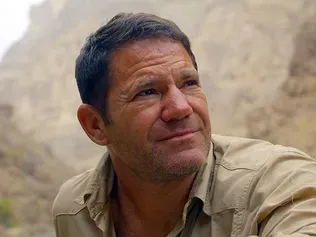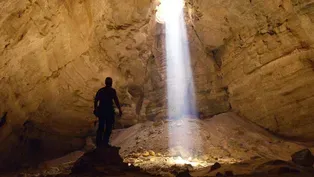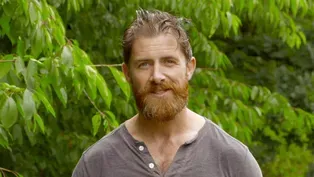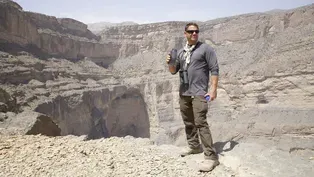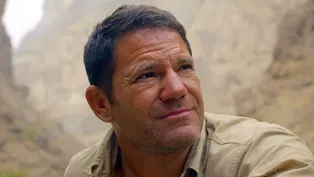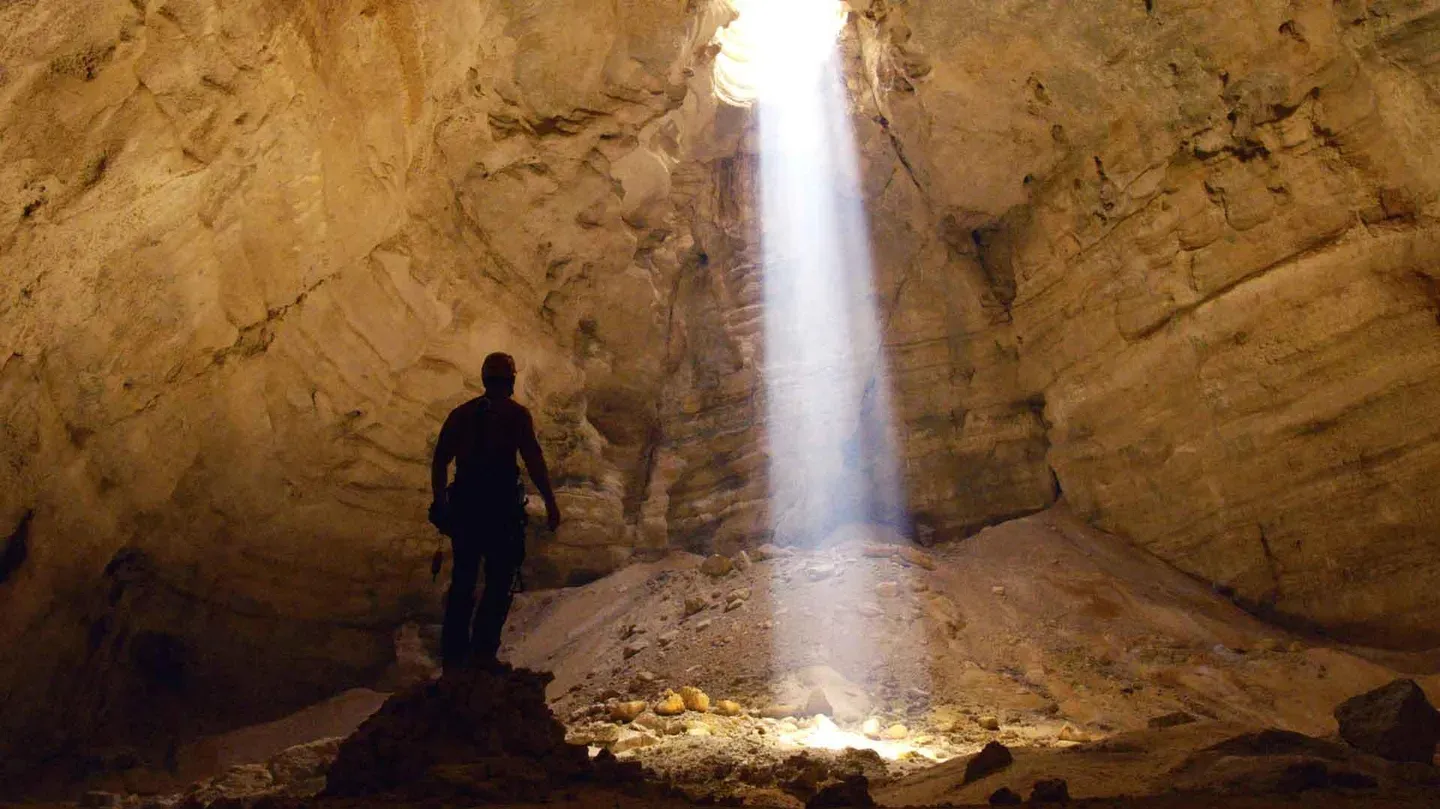

Oman - Desert Canyon
Season 1 Episode 1 | 48m 18sVideo has Closed Captions
Follow Steve Backshall into an Arabian desert canyon that no human has ever explored.
Follow Steve Backshall to Oman, where he plans to drop nearly 1,300 feet into the deepest canyon in Southern Arabia. In the scorching desert heat, Steve and his team will explore an area where no human has ever set foot.
Problems with Closed Captions? Closed Captioning Feedback
Problems with Closed Captions? Closed Captioning Feedback

Oman - Desert Canyon
Season 1 Episode 1 | 48m 18sVideo has Closed Captions
Follow Steve Backshall to Oman, where he plans to drop nearly 1,300 feet into the deepest canyon in Southern Arabia. In the scorching desert heat, Steve and his team will explore an area where no human has ever set foot.
Problems with Closed Captions? Closed Captioning Feedback
How to Watch Expedition
Expedition is available to stream on pbs.org and the free PBS App, available on iPhone, Apple TV, Android TV, Android smartphones, Amazon Fire TV, Amazon Fire Tablet, Roku, Samsung Smart TV, and Vizio.
Buy Now

Meet Steve Backshall
Steve Backshall takes PBS behind his adventures, explains how the expeditions are chosen, and explores our role in protecting these magnificent locations.Providing Support for PBS.org
Learn Moreabout PBS online sponsorship[tense music] I'm Steve Backshall, a naturalist and explorer.
I'm in Oman.
A scorched desert land of vast mountains and even bigger canyons.
AHH!
Ow, ow, ow!
Where survival depends on an in creasingly scarce resource... water.
This expedition will take me and a team of experts into the heart of the Al Hajar mountain range.
Through oasis villages, and down colossal abseils.
All in pursuit of our ultimate goal - to descend through a canyon that no human has explored before.
[Steve] That's too quick.
It's really heating up.
Get in there.
Oh, my God.
I can smell the rope burning.
Oman.
One of the driest places on Earth.
But it's a landscape shaped by water.
Torrents of rain have carved out deep canyons, or wadis.
Rainfall is infrequent yet intense... running off the land and surging through these canyons.
But it doesn't last.
Surface water is rare.
And water could make or break this expedition.
My team and I are in the Al Hajar mountains.
We're here to attempt the first descent of an unexplored canyon.
But we need to be prepared.
So first, we're staring our mission 25 kilometres to the north-west... to take on the ultimate training run.
This is Jebel Shams, Oman's highest mountain.
Here, the canyons are a kilometre deep.
Whoa.
Well, we've done some big abseils together in the past, but... that's out there, isn't it?
This is the biggest single drop abseil we've done.
Big doesn't do it justice.
This is one of the longest single drop abseils on the planet.
At nearly 400 metres, it's four times the height of London's Big Ben.
It's extreme but we'll find out for sure whether we're ready to take on the unexplored canyon.
We'll begin rope rigging early tomorrow.
Tonight, we'll camp at the top.
I got myself into the worst possible place on the trail.
The donkey in front just keeps letting rip with the most unimaginable stink.
And then the donkey behind, if I stop or slow down, bites me on the backside.
Annoyingly, I'm allergic to donkeys and horses.
Not much, just, sort of, look like I'm crying.
My good friend and ex-Royal Marine Aldo Kane is a rope specialist and our medic.
[Aldo] With temperatures like this, plus 35 degrees Celsius, it doesn't take long at all to run into dehydration and then into heat exhaustion and then, ultimately, heat stroke.
Heat stroke can and will kill.
[Steve] Only two people have ever made this 400 metre descent.
And Khaled Abdul Malak, renowned canyon explorer, is one of them.
He would start on the cliff for around 20, 25 metres.
And then you are hanging, like a spider, and the cliff keeps on going away from you.
So, you're practically flying.
[Steve] Rigging such a huge drop requires more than one rope specialist.
Justin Halls has been abseiling in Oman for more than a decade.
The first abseil we're gonna commit to is just under 400 metres which, er, is pretty crazy considering there isn't any descending equipment invented yet, really, that is designed to cope with that sort of drop.
Look at that!
An abandoned village.
This will be our camp for the night.
That's the first water I've seen above ground.
Instantly, the second you get water, you get life.
[frog croaks] Hey, look at that!
That is a little beauty.
So this is a wadi racer.
It's harmless to us as human beings.
They have got fangs and a very, very mild venom.
This one's hanging out in the wadi hunting things like tadpoles from Arabian toads.
But you gotta be quite confident about snakes round here because some of the most dangerous to human beings are found in this area.
That's lovely.
Before sundown, we get a closer look at what's in store for tomorrow.
It's hard to believe that this is the practice run.
[tense music] [Steve] I think it's really important that we're rational today.
My concern is for my team, for my crew.
There may come a time when we need to say, "This is too full on.
Let's take a step back."
We're gonna make wise decisions today And we'll call things as is most safe.
First thing in the morning, Aldo and Justin start securing 400 metres of rope to the rock wall.
[Aldo] There's always something about just going over the edge for the first time, regardless of how many times you do it.
Despite the dizzying feeling in the pit of your stomach every time you look over the edge, we're all set for something very, very special.
[tense music] [rocks falling] [Aldo] What was that?
-That's coming down there.
-Where?
Cor, there's nothing more terrifying than being on the rope and hearing a rockfall that big.
Just shows you how... [sighs] ...dangerous this place is.
[Justin] That wind's picking up.
[Steve] This might be one of the highest peaks on the Arabian peninsula.
But 90 million years ago, this rock was part of the seabed.
The evidence is absolutely everywhere.
So, all the rocks are like this, you can see that that is the helical whirl of the shell of a marine snail.
And all of these little white flecks in the rock, and there are millions of them, every single one is a fossil of a shell, of a mussel or a clam or a whelk or a scallop, some of them very recognisable.
All of this was laid down on a shallow seabed.
And we're now 2,000-odd metres above sea level in the hottest, driest place you could ever imagine.
Rigging the ropes has taken Aldo and Justin eight hours.
We'll now have to make our descent in the hottest part of the day.
It's a brutal 40 degrees.
You alright, Aldo?
How you doing?
It's, er, terrifying.
Director Rosie Gloyns and her film crew are the least experienced abseilers among us.
These conditions are just too extreme for them.
Yeah, I would very definitely have my worries about chucking you guys off.
[Rosie] Yeah.
I mean, there's no point putting the whole team at risk for the sake of us going down there.
Unable to make the huge drop, th e film crew will drive around to meet us at the end of the canyon.
Aldo, Justin, Khaled and I will continue.
We need to test our kit and ourselves before the unexplored canyon in two days' time.
These are specially made 400 metre lengths of rope.
Anything more than 200 metres you have to have made specially.
The rope is thinner than my finger but strong enough to hold the weight of a family car.
We're running.
More than enough to take me and my 40 kilo kitbag.
[Aldo] Going down.
-[Steve] Whoa.
-[Aldo] Yeah.
[Steve] This is immense.
Whoa!
That is a long way down.
-[Aldo] Yeah.
-Oooh!
Mercy me.
[Steve nervous laughing] I've never said the expression, "Mercy me," in my entire life.
[daunting music] At the edge of the overhang, Aldo helps me to attach myself securely to the huge free-hanging descent rope.
[Steve] Yeah.
-Oh, feel that wind.
-[Aldo] Yeah.
Right, that's me.
[nervous sigh] Whoa!
[Steve panting] Oh, my goodness.
That... is... [sighs] Unbelievable.
We're dropping pretty fast at the moment.
I've got to be careful not to go too fast... [Steve on radio] ...because, obviously, there's a real danger of heating up the equipment and burning through the ropes, which would be... Ahh, just had my first look down.
Whoa!
[wind whistling] OK. [Steve sighs] Oh, my God.
I can smell the rope burning.
It's really heating up.
I can smell burning.
Ahh.
Whoa, that's too fast.
Too fast.
I need to slow down.
I need more friction.
Putting loops in the rope will help.
But the rope beneath me weights about 30 kilos.
A third of my own body weight.
[grunts] That's too quick.
That's too quick.
One more loop.
Eurgh, get in there!
Ah, yes!
It takes over half an hour but I make it to the bottom.
Ahh, yes!
Ahh, yes.
[sighs] Down.
Alive.
Safe.
You beauty.
With daylight running out, Aldo makes his descent.
It gives me just as bad vertigo looking up as it did looking down.
And he's going.
[tense music] One thing about when you're doing stuff like this I can tell... [sighs] ...when I'm gripped with fear is...talking to myself.
Feel like... need more friction.
[Aldo grunts] Too little resistance on the rope would mean a dangerously rapid descent.
[Aldo grunts] To control his speed Al do has to lift the heavy rope and feed it through his descender.
Progress is slow.
[Aldo] I'm probably only... a third of the way down.
[tense music] Jesus, that's a long way down, still.
Ahh!
Aldo's so, so experienced on ropes and the fact that he's having trouble on this, it was just the right call that we didn't go down.
That is the tongue of someone who has been working... [grunts] ...all day on this face.
[grunts] Ah, cramp!
I need... a drink.
Cramp is a sign of extreme dehydration, which can lead to heat stroke.
I'm knackered.
Here, that could be fatal.
Cramp!
[grunts] Aldo needs to get down as quickly as the equipment and his body will let him.
He's been on the ropes for over an hour.
-[radio bleeps] -[Steve] You're almost down.
[Aldo on radio] Mate, I can't even... Ah.
I got it, I got it, I got it.
I can't hold the rope.
Ah!
Everything's cramping, mate.
[sighs] [Steve on radio] Aldo is down, down and on the ground.
Over.
OK, thanks, Steve.
Is he OK?
Very dehydrated and cramping and he had a bit of a nightmare on the way down.
Well done.
Glad to hear he's down.
Over.
As Justin and Khaled prepare for their descents... Aldo and I search for a safe place to sleep.
[laughs] [Aldo] Run me through the options.
So, the wadi would be most comfortable, the stream bed, but if it rains we'll all die.
Er, here we'd, kinda, be alright but if anything falls off the top, we'll all die.
And up on the scree is scree, so if we tried to camp there, we'd all die.
[laughs] We take our chances and make camp in the boulder field.
Three hours later, Khaled and Justin make it to the bottom.
[Steve] You alright there, mate?
[Khaled] Er, no.
This has tested us all to the limit.
[Steve] Nearly there, Justin.
You're nearly there.
[Justin] I've lost all strength in my wrist, buddy.
My God.
He did it.
Crazy job, man.
Give me five.
[laughs] -Not with that hand.
-No, slowly, slowly.
It's just been a long, long day, hasn't it, Steve?
Yeah, it has, mate.
[Steve] Well, that was quite an evening.
And it's not done yet.
We have a lot of canyon to go before we can get back out to meet the rest of the team.
So, I'm gonna turn in.
My God.
[Aldo] Morning, mate.
Sleep well?
Er, yeah.
Not too bad.
-Morning, Khaled.
-Eh!
Morning, Steve.
-[Khaled] How are you?
-Not too bad.
Monsieur Justin!
Bonjour !
There's one there, just on that.
Without the camera crew, filming falls to us.
Oh, mate, I've got a new career.
-Wildlife cameraman.
-Wildlife cameraman.
Water from this slimy pool is enough to replenish our supplies.
Ah, rehydrated, drank about four litres of water between last night and this morning.
Oral rehydration salts and a good sleep and I'm back on form.
Though we've done the big drop, training still continues.
[tense music] Ahead there's another 700 metres of descent.
Down through the canyon carrying everything that we might need rope, food and camping gear.
It's, kinda, like wandering down through these rocks with a fridge on your back.
The slightest wobble and you'll go over.
And a twisted ankle down here is unthinkable.
The weight makes steep scrambles treacherous.
Abseils are safer but slow us down.
These dry falls are formed by the movement of water.
There are still now flash floods that rip through here.
Just a few hours of heavy rain and this would be a thundering morass of white water.
You can just barely believe you're in the same place.
It's like all of sudden coming through a tropical rainforest.
Look at that!
My problem now is that my ropes are dropping into deep water.
With this heavy bag, it would definitely pull me under.
So, I have to try and get out to the side as much as possible but the problem with that is if I lose my footing, then I'll pendulum and swing.
[exhales slowly] [loud splashing] This is fine, Aldo.
There's a little ledge here!
[Aldo] OK!
[screams] Ow, ow, ow!
-Ah!
-[Aldo] Are you OK?
Dammit!
Yeah, yeah, I'm alright.
A small slip.
But a stark reminder of the dangers we face.
After ten hours in the quiet of the canyon, we hear a familiar sound.
[Khaled] Ah, the drone is coming!
Woo hoo!
[drone whirring] [laughter] -Hello!
-Hello!
[sigh of relief] Oh, hello, mate.
Thanks for waiting for us, Rosie.
You're a legend.
Nice work, buddy.
Got to say, you've got a bit of a sweat on there.
Look at this.
Well done, mate.
[laughing] -So good.
-Thank you, mate.
Ahh!
Woo!
Hey.
Hey.
-How are you?
-Excellent.
Nice one, well done.
Thanks.
Yeah, it's interesting that that's the warm-up.
Yeah.
The training has been a wake-up call.
Heavy bags slow us down.
And dehydration is a real danger.
In the next canyon finding water is far from guaranteed.
Here in Oman, access to water is paramount.
The difference between life and death.
But somehow, people do manage to live in these mountains.
Hamid Al-Shabnooti, our translator, takes us to learn the secret of their survival.
[Hamid] Ten years ago there used to be water all the time here.
The kids from the village they said to me that they used to learn swimming in this canyon.
-Really?
-When they were kids, yeah.
But now that's all what's left.
Like, before we used to have a lot of rain in the winter.
Now, we don't have any rain in the winter.
And in summer, we have rain for, like, one hour, two hours, and then the next day, disappear because of the heat.
So, a hard life is getting harder?
Yes.
[ethereal music] We emerge from the canyon into an oasis.
Bilad Sayt, an ancient village hidden in the limestone peaks.
[Steve] Well, talk about the desert brought to life.
Enormous amounts of palms.
Pomegranate, we have bananas.
Wow.
All of which needs a lot of water.
Yeah.
But that's in short supply.
And what little there is has to be shared out fairly amongst the villagers.
An important role that falls to the "wakil", or responsible one.
Distribution is via a network of canals called a falaj system.
[Hamid] He's channelling the falaj to go to his street.
[Aldo] This is all they block the falaj so all it is, is simply two or three boulders and some rags tucked down beside it.
To block the gaps and the water hits it, and then it's directed.
Pretty genius.
Rain water collects in natural reservoirs hidden deep within the mountains themselves.
From there it's channelled down to the village.
This ingenious irrigation system, powered by gravity alone, provides a vital source of water to an arid land.
[Steve] It feels like a sanctuary.
But all of this is only possible when you have that intricate balance of how the water is metered out.
And if any of that changes, you get more people or you get less water, then this whole thing is gonna collapse.
And right now, they have both those things.
More people and a lot less water.
It's a really frightening thought that all of this is on a knife edge, effectively.
The people that live here are eking out what water they do have with precision.
We will have to do the same.
We leave Bilad Sayt an d head for our ultimate goal.
The unexplored canyon.
25 kilometres south-east of Jebel Shams is an abandoned village.
It marks the start of our canyon.
The end point is where it joins another canyon.
Already mapped, Wadi Hidri will be our next and on ly guaranteed source of water.
[Steve] We got in quite late last night, it was dark.
I've woken up this morning to our first glimpse of what we're taking on.
We're higher than I thought.
We're over 2,000 metres here, which means that we've got... about 11, 1,200 metres of descent to get down and out of this thing.
So, it's gonna be big.
Khaled, our canyon expert, has been exploring these mountains for years.
This one is really, for me, I would say, totally unknown.
Because the other ones, I used to study them coming up stream to study the canyon and going down stream to study the upper part of the canyon.
But this one both ends are unknown.
So, for me, it would be a first.
We know th at it's five kilometres long.
But that's all we know.
No one has ever descended this canyon.
And it's too narrow to plan a route using satellite images.
[Steve] There's no way that this first bit is unexplored.
But, I guess, as we go on further eventually we're gonna hit a drop, a big drop off.
And beyond that big drop... Who knows.
This is proper exploration.
And this time, we need the film crew.
They'll be pushed to their limits if we come to any really big drops.
But right now, it's the heat that's worrying us.
[Aldo] You saw how quickly I went into early stages of heat exhaustion the other day and that was just being out in the sun for a few hours rigging, so, once we get inside these canyons they're like furnaces, so, erm, just be aware of that.
We need to drink around a litre of water every hour.
Water's heavy so we can barely carry enough for even half a day.
We need to find a pool in this canyon.
We set off at 6:00 a.m. to cover as much ground as we can before the suffocating heat of the midday sun.
Our first obstacle, a 20 metre cliff.
So, we might be able to scrabble around this.
Go up here high and then come round here.
Definitely not this way.
Abseils eat up time, so we scramble whenever we can.
So, we just taking on lots of water and just hoping, hoping that we're gonna find water down there.
If we don't, we're absolutely stuffed.
[tense music] We reach a point where scrambling with heavy bags is too dangerous.
We need to abseil.
[Steve] There's no water at the bottom of this drop here as far as we can see.
Everyone's water's getting low.
And before we arrive this evening everyone's gonna need water for sure.
So, now, we need to start moving a bit more quickly.
While the rest of the team make their way down... Khaled and I push on to find water.
[Steve] So, I've scrambled down a fair way... [Steve on radio] ...and it is just nasty boulder descent.
There is no sign of water.
It's not looking great from wh ere I am, I have to say.
Over.
[Aldo] So, guys, just be prepared for a bit of a slog out.
Try and conserve your water a little bit if you can.
We don't know when the next bit will be.
Everyone happy?
[tense music] In the exposed canyon, there's no respite from the relentless heat.
[Khaled] Yes, yes!
There is water.
It's a tiny stagnant pool.
But it's a life saver.
Everybody is out of water so this is amazing.
And we're not the only ones making use of it.
This is called a water scorpion.
They are a real weirdo of an animal.
They breathe through this tube at the back end here, it's like a snorkel, they leave that up at the surface.
And these are predatory.
They capture things like tadpoles with those predatory, raptorial forearms at the front.
And then they inject them with digestive enzymes.
And suck out the meat soup afterwards.
Whoa!
Ahh, they're like little aliens.
So, quite glad I'm wearing my leather gloves because the bite is extremely painful.
[sighs] Well, that's the end of the line for us today.
[triumphant music] We're facing our biggest challenge yet.
This is what we've been training for.
[anthemic music] A colossal sheer drop.
This is incredible.
You know, this is not on any map.
There's no guidebook.
And we are the first team ever to be here.
Amazing.
It is incredible that in this day and age you can still find places like this.
[wind whistling] Tonight, we'll make camp where we can.
Do you know what I like when you're in these places?
Is just making somewhere inhospitable your little, like, home for the night.
This'll do.
Comfy, flat.
[sighs] Ah!
Home sweet home.
Look at that!
That's genius that is.
That's like a four-poster bed.
Oh!
[Aldo] But without the posts and the mattress.
-Lovely.
-And the bed.
[Aldo] We're breaking, like, all ten of the rules in the where to camp book.
At the top of an 80 metre drop, in a wadi where it can flash flood, and in a place where it's overhanging on both sides.
But, apart from that... fairly good place to camp.
If we did have a flash flood.
We'd want to scramble up here to that little ledge there.
I mean, nowhere's... nowhere's perfect.
There's no absolute way of getting out of it.
The skies are clear.
I think we're gonna be OK. [ethereal music] Yesterday, we got down through the wider, broader part of the canyon.
And last night found ourselves at the top of a substantial drop.
From here, it's only two kilometres to our goal - the pools at the larger canyon, Wadi Hijri.
But first, we have to tackle this drop.
An enormous dry waterfall.
[wistful music] [laughs] OK, chaps, I will see you below.
This feels like I've just uncovered some extraordinary treasure.
So, so exciting.
[anthemic music] I'm more used to going up trees about 30 metres in the jungle.
So, like, big 80 metre rocky drops are still a bit new to me.
For the film crew, this is the biggest abseil they've ever faced.
Yet, one by one, they successfully navigate the descent.
[Rosie] Woo hoo!
That was amazing.
[sighs] [Steve] A lot of people wonder why we put ourselves through all of the heat and the sweatiness and the fear and the danger and the pain and it's for moments like this.
And you know that yours are the first human eyes ever to look at it.
And there's so much going on.
These oleander bushes here have glorious pink flowers in them.
Dozens of different kinds of wasps and butterflies.
Giant dragonflies.
This environment is so hard, it's so harsh, it's so challenging but the rewards it gives you.
Just makes it extra, extra special.
We need to replenish our supplies and get moving.
[wind howling] There's trouble brewing overhead.
[Aldo] Yeah, check the clouds out.
It's the first time I've seen them forming and moving like that.
Let's just hope that it doesn't rain while we're in here because there's no way out.
Flash flood through here right now would be curtains.
So, er, we just need to keep an eye on it, basically.
I've been watching them since the top of the last drop and they're starting to look a little bit heavy.
Even rain further up the valley could surge through here in no time.
OK, right.
See you in a sec.
I got ahead to set up the next abseil with Khaled.
But we're stopped in our tracks.
Hey!
Carpet viper.
No way, no way!
Come, come, it's hissing, it's hissing.
-Come on, come on.
-OK. OK. [Steve] Don't go any closer.
[Khaled] No, it's not moving.
[Khaled] Thank, God.
I didn't step on them.
These are saw-scaled viper.
And I spend most of my life trying to tell people that animals are not dangerous to us as human beings and we shouldn't be frightened of them.
They mean us no harm.
This is one of the few exceptions to the rule.
The saw-scaled viper could be the most dangerous species of snake on the planet to us as human beings.
Just see if I can get this out into the open.
It's having a little snap at me there, at the stick.
So, there he is.
There he is.
The saw-scaled viper has hinged fangs that lie along the upper jaw and are stabbed into prey, injecting a venom which affects the blood and the circulatory system and the muscles.
It's fast acting, very, very powerful.
This snake was right at the bottom of our rope, So it would have been so easy for someone to step off the abseil and step right on the sawscale viper and that would be, probably could be, the most dangerous thing that you'd find in this canyon.
OK, guys, right at the bottom of the ropes we have two snakes, two saw-scaled vipers.
So, I need you to come down slowly and carefully and be very careful about where you put your feet.
Over.
Khaled steers everyone safely past the vipers.
Go up a little bit, just a little bit, half metre.
Here you're fine.
Cross at this level.
Er, just under there.
Big dark clouds gathering on the mountains over there.
We need to get a move on.
[tense music] We just felt rain.
Right, let's move.
Fast.
We're, pretty much, locked into this canyon now in quite a tight boulder choke.
Ah, this is not the place to be trapped in.
[tense music] [Rosie] We're just entering a place that's super thin.
If the rain came now that'd be really dangerous, so we need to get through here quickly.
Erm...
I think there's probably a bit of rain coming we thought we'd passed all the abseils, but, there's, er, a final one of two, three metres that we just need to drop down, but... this is not the place that we want to be stuck.
-OK. -Yeah.
[tense music] We're, literally, only 500 metres, half a kilometre from the main canyon where we can at least get back up and out.
Finally, we 're out of the narrow section.
And should be out of danger.
Then, we hear running water.
These are the pools of Wadi Hijri.
Look at this.
Look that way.
Un-believable.
The end of the unexplored canyon.
Look at this, it's running.
There's a waterfall!
We're back in known territory.
Aww, that's amazing.
That's amazing.
This is part of a known and mapped canyon.
So, we know that it's only about a five hour walk out from here, which we'll do tomorrow.
I don't mind admitting that was a... that was a hard day.
I am broken.
[anthemic music] It's been tough on all of us but worth it.
Revealing undiscovered wonders... hidden away within these walls.
[Steve] The desert gives you a very special appreciation of water.
And it makes you acutely aware of the challenges that people here are facing now and, more importantly, are going to face in the next couple of decades.
There's an increasing population here, there is no water system in the world that is more stressed.
Every single drop is gold dust.
And it is evaporating away before our eyes.
♪ EXPEDITION WITH STEVE BACKSHALL IS AVAILABLE ON AMAZON PRIME VIDEO ♪ ♪
Episode 1 Preview | Oman - Desert Canyon
Video has Closed Captions
Preview: S1 Ep1 | 30s | Follow Steve Backshall into an Arabian desert canyon that no human has ever explored. (30s)
Video has Closed Captions
Clip: S1 Ep1 | 1m 53s | During an abseil, the team stumbles upon a highly venomous saw-scaled viper. (1m 53s)
Video has Closed Captions
Clip: S1 Ep1 | 6m 54s | Learn the challenges faced with a drop of about 400 meters whilst abseiling Jebel Shams. (6m 54s)
Video has Closed Captions
Clip: S1 Ep1 | 1m 44s | Steve Backshall and a team of experts prepare to descend a canyon in Oman. (1m 44s)
Video has Closed Captions
Clip: S1 Ep1 | 46s | Despite how dry Oman is, water has played a large role in shaping the country's landscape. (46s)
Steve and Aldo’s Training Diary
Video has Closed Captions
Clip: S1 Ep1 | 1m 24s | Steve and Aldo film the wildlife and landscape of Oman during their abseil training. (1m 24s)
Providing Support for PBS.org
Learn Moreabout PBS online sponsorshipSupport for PBS provided by:
